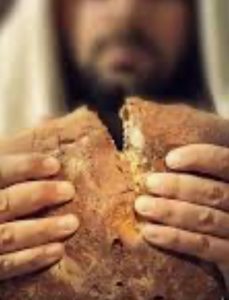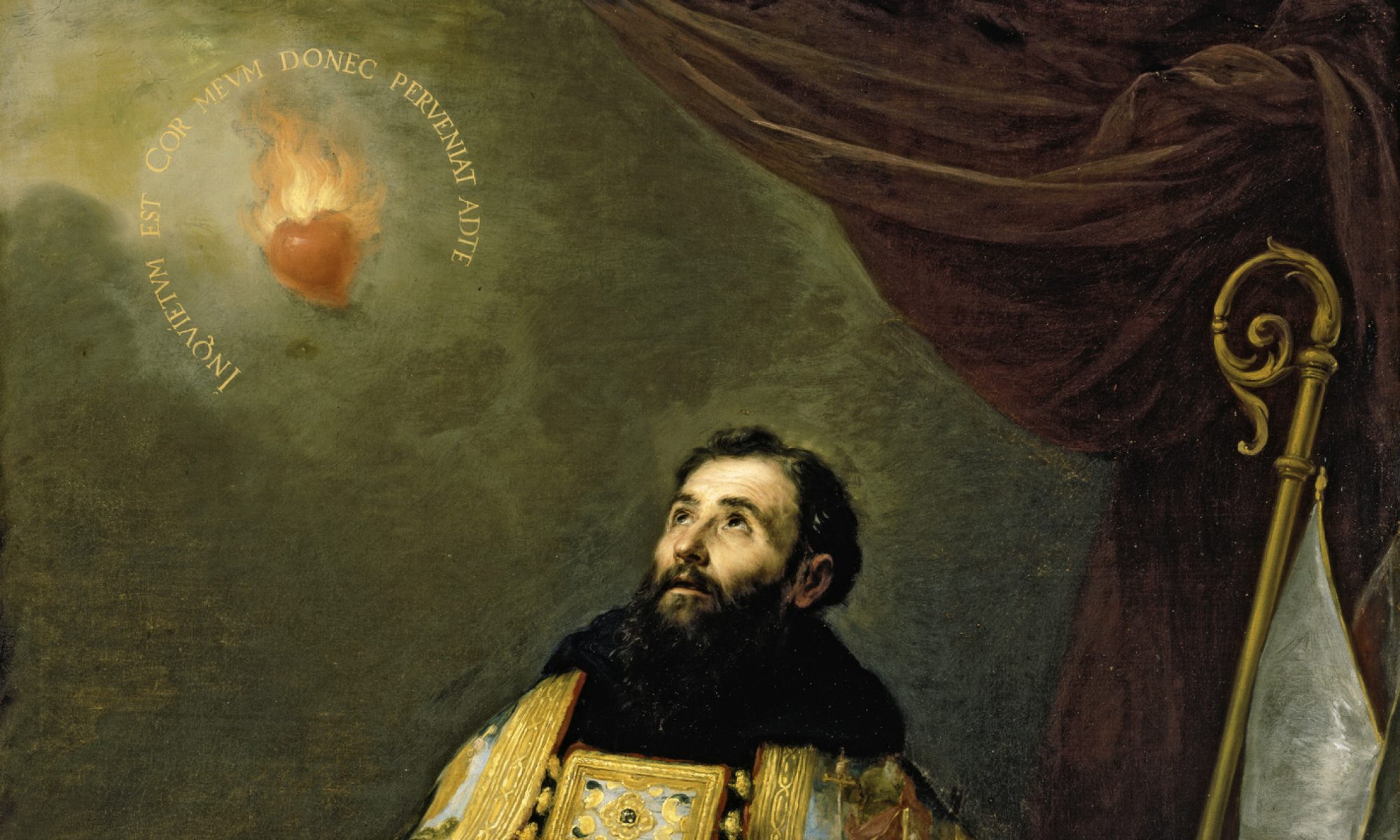Today is the 19th Sunday in Ordinary Time, Year B. For three consecutive Sunday readings, we are given an opportunity to reflect and have a better understanding of the teaching of Jesus Christ’s real presence in the Eucharist, which is further explained by the Holy Catholic Church with her teaching authority. The Eucharist is an eternal offering of the gift of Jesus’ flesh and blood for our provision and nourishment on our journey to eternal life.
The first reading from the first book of Kings narrates to us the empowering of the Prophet Elijah, who was appointed by God to bring order and a clear message to the disobedient people of Israel. Their unfaithfulness is obviously prevailing during their journey as the chosen people. Elijah was so devastated that he asked for death, but instead God reaches him through an angel. He was encouraged to live, eat and continue his mission and journey with the people he ministered. Elijah was touched by him and cared for him so much that he moved on, knowing his life must go on.
Sometimes we find ourselves in a desolate situation where we have given up on our life continuing. Amid difficulties, we give in to frustrations, like Elijah, with no hope and no energy to live because we are lonely and anxious about life. However, we neglect to see around us that the divine presence manifests amongst those who love and care for us. We are not alone, for God journeys with us to feed our troubled spirit. It is encouraging to take our moment to know how God loves us and offers Himself to us.
In the second reading from the letter of St. Paul to the Ephesians, St. Paul warns against the people’s attitude, “bitterness, fury, anger, shouting and reviling must be removed from you, along with all malice.” This is the mark of being Children of God, bearers of the “fragrant aroma” offered by Jesus’ sacrifice and love. Let us forgive and be compassionate to each other just as “God has forgiven you in Christ Jesus according to St. Paul.
In today’s gospel taken from St. John, Jesus is revealing Himself as the Way to the Father by close affinity, oneness to the Father, and the promise of eternal life for those who believe in Him as the Bread of Life. Chapter 6 of John’s gospel centers around Jesus’ words about His being from God and His being nourishment for eternal life. There are three important utterances of His words we need to reflect on.
First, Jesus says, “I am the bread of life that came down from heaven.” This is the beginning of murmuring because they cannot accept His words. They have witnessed the event when they were in the wilderness, and God provided them manna from heaven. God embraced them and showed loving kindness towards them, and yet they have a short memory of the event when Jesus multiplied the loaves and fish of which they themselves have partaken.
In the Eucharist which we celebrate today, we are aware of God sustaining, nourishing, teaching and drawing us closer to Him, our great provider. Every day of our life, God reaches out to us..
Second, Jesus says, “Everyone who listens to my Father and learns from Him comes to me. Not that anyone has seen the Father except the one who is from God, he has seen the Father.” True knowledge and intimacy with God is an experience of an intimate relationship with Jesus. If we want to learn from Jesus, let us draw near Him through righteousness and purity of hearts. In Proverbs 3:32, “For the Lord detests the perverse but takes the upright into his confidence.” Jesus is, indeed, the model of intimacy with God because He and the Father are one. (John 10:30) So, Jesus goes on to teach them and by listening to Him, God is teaching them, but unfortunately, some will not see the signs and hear the word for they refuse to eat the bread which comes down from heaven in a similar way.
Third, Jesus says, “Whoever believes has eternal life. I am the bread of life…and that I will give is my flesh for the life of the world.” Obviously, some people can’t accept and believe in Jesus being the “Bread of Life.” More so, Jesus as the Bread comes down from heaven and offers eternal life. There was a great debate when people heard Jesus’ words. However, there is a clearer path to understanding, that is to accept or take into one’s life the person and life of Jesus.
Personally, believing in the Eucharistic Real Presence is an issue within us to believe in Jesus and to come forward to receive Him. Our comfort is more than our receiving the Eucharist, but that we have taken Him into our hearts and allowed ourselves to be touched by His real presence. Elijah moaned, “This is enough, O Lord! Take my life,” Jesus says to us, “I am enough! You take my life, eat it all, live it all and you will be already living the eternal life I came and come to share.”
May God bless us with His Eucharistic presence! Psalm 34 reminds us, “Taste and see the goodness of the Lord.”
Fr. Arlon, osa
———————
El Dictado del Corazón
Decimonoveno Domingo del Tiempo Ordinario, Año B
- 1 Reyes 19:4-8
- Salmo 34:2-3, 4-5, 6-7, 8-9
- Efesios 4:30-5:2
- Juan 6:41-51
Hoy es el Decimonoveno Domingo del Tiempo Ordinario, Año B. Durante tres lecturas dominicales consecutivas, se nos permite reflexionar y comprender mejor la enseñanza de la presencia real de Jesucristo en la Eucaristía, que la Santa Iglesia Católica explica con más detalle con su autoridad docente. La Eucaristía es una ofrenda eterna del don de la carne y la sangre de Jesús para nuestra provisión y alimento en nuestro viaje hacia la vida eterna.
La primera lectura del primer libro de los Reyes nos narra el empoderamiento del profeta Elías, quien fue designado por Dios para traer orden y un mensaje claro al pueblo desobediente de Israel. Su infidelidad prevalece durante su camino como pueblo elegido. Elías estaba tan devastado que pidió la muerte, pero en cambio, Dios lo alcanzó a través de un ángel. Se le animó a vivir, comer y continuar su misión y su camino con el pueblo al que ministraba. Elías se sintió tocado y se preocupó tanto por él que siguió adelante, sabiendo que su vida debía continuar.
A veces nos encontramos en una situación desoladora en la que hemos renunciado a que nuestra vida continúe. En medio de las dificultades, cedemos a las frustraciones, como Elías, sin esperanza y sin energía para vivir porque estamos solos y ansiosos por la vida. Sin embargo, descuidamos ver a nuestro alrededor que la presencia divina se manifiesta entre quienes nos aman y cuidan. No estamos solos, porque Dios camina con nosotros para alimentar nuestro espíritu atribulado. Es alentador tomarnos un momento para saber cómo Dios nos ama y se ofrece a nosotros.
En la segunda lectura de la carta de San Pablo a los Efesios, San Pablo advierte contra la actitud de la gente: “Apártense de ustedes la amargura, la ira, la furia, los gritos y las injurias, junto con toda malicia”. Esta es la marca de ser hijos de Dios, portadores del “fragante aroma” ofrecido por el sacrificio y el amor de Jesús. Perdonémonos y seamos compasivos unos con otros, así como “Dios los ha perdonado en Cristo Jesús según San Pablo”.
En el evangelio de hoy tomado de San Juan, Jesús se revela como el Camino al Padre por la estrecha afinidad, la unidad con el Padre y la promesa de vida eterna para aquellos que creen en Él como el Pan de Vida. El capítulo seis del evangelio de Juan se centra en las palabras de Jesús acerca de que Él viene de Dios y es alimento para la vida eterna. Hay tres declaraciones importantes de Sus palabras en las que debemos reflexionar.
Primero, Jesús dice: “Yo soy el pan de vida que descendió del cielo”. Este es el comienzo de la murmuración porque no pueden aceptar Sus palabras. Fueron testigos del evento cuando estaban en el desierto, y Dios les proporcionó maná del cielo. Dios los abrazó y les mostró bondad amorosa, y sin embargo tienen un breve recuerdo del evento cuando Jesús multiplicó los panes y los peces de los cuales participaron.
En la Eucaristía que celebramos hoy, somos conscientes de que Dios nos sostiene, nos nutre, nos enseña y nos acerca a Él, nuestro gran proveedor. Todos los días de nuestra vida, Dios se acerca a nosotros.
En segundo lugar, Jesús dice: “Todo el que escucha a mi Padre y aprende de Él viene a mí. No que alguien haya visto al Padre, sino el que viene de Dios, ése ha visto al Padre.” El verdadero conocimiento e intimidad con Dios es una experiencia de una relación íntima con Jesús. Si queremos aprender de Jesús, acerquémonos a Él a través de la rectitud y la pureza de corazón. En Proverbios tres:treinta y dos, “Porque el Señor aborrece a los perversos, pero acoge a los rectos en su confianza.” Jesús es, de hecho, el modelo de intimidad con Dios porque Él y el Padre son uno. (Juan diez:treinta) Entonces, Jesús continúa enseñándoles y al escucharlo, Dios les está enseñando, pero desafortunadamente, algunos no verán las señales ni oirán la palabra porque se niegan a comer el pan que desciende del cielo de manera similar.
En tercer lugar, Jesús dice: “El que cree tiene vida eterna. Yo soy el pan de vida… y lo que daré es mi carne por la vida del mundo.”Algunas personas no pueden aceptar y creer en Jesús como el “Pan de Vida”. Más aún, Jesús como el Pan baja del cielo y ofrece vida eterna. Hubo un gran debate cuando la gente escuchó las palabras de Jesús. Sin embargo, hay un camino más claro para entender, que es aceptar o tomar en la propia vida la persona y vida de Jesús.
Personalmente, creer en la Presencia Real Eucarística es una cuestión dentro de nosotros para creer en Jesús y dar un paso adelante para recibirlo. Nuestro consuelo es más que recibir la Eucaristía, lo hemos tomado en nuestros corazones y nos hemos dejado tocar por Su presencia real. Elías gimió: “¡Esto es suficiente, Señor! Toma mi vida”, nos dice Jesús, “¡Soy suficiente! Toma mi vida, cómela toda, vívela toda y ya estarás viviendo la vida eterna que vine y vengo a compartir”.
¡Que Dios nos bendiga con Su presencia Eucarística! El Salmo treinta y cuatro, nos recuerda: “Prueben y vean la bondad del Señor”. “Alabado sea el Señor.”
Padre Arlon, osa

